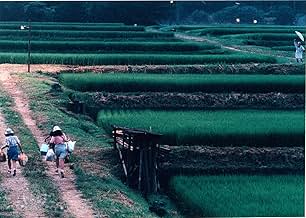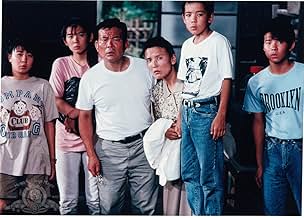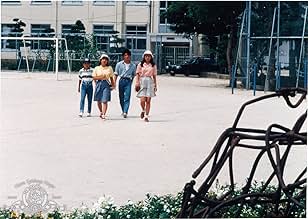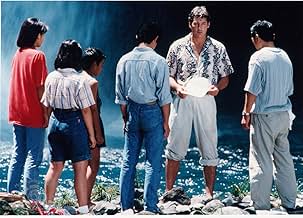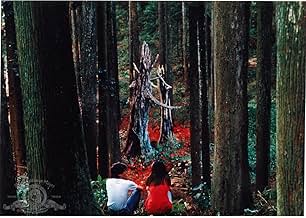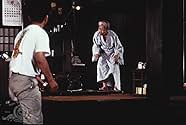PUNTUACIÓN EN IMDb
7,2/10
7,8 mil
TU PUNTUACIÓN
Añade un argumento en tu idiomaThree generations' responses to the atomic bombing of Nagasaki.Three generations' responses to the atomic bombing of Nagasaki.Three generations' responses to the atomic bombing of Nagasaki.
- Premios
- 5 premios y 7 nominaciones en total
Richard Gere
- Clark
- (as Richâdo Gia)
Mieko Suzuki
- Minako
- (as Mie Suzuki)
Argumento
¿Sabías que...?
- CuriosidadesAt the top of his career from starring alongside Julia Roberts in Pretty Woman (1990), Richard Gere was earning millions of dollars per picture. Akira Kurosawa's company felt they were unable to pay his salary, to which Gere responded with "I'll work free for Kurosawa." Not wanting to take advantage of the actor, they offered him a modest sum, as well as offering to pay for all his travel expenses, including friends he wanted to bring with him to Japan while he worked. One of those friends included Cindy Crawford.
- Banda sonoraNobara (Heidenröslein)
Lyrics by Johann Wolfgang von Goethe (uncredited)
Music by Franz Schubert (as Shûberuto)
Performed by Hibari Jidou Gasshoudan (Hidetaka Yoshioka, Tomoko Ôtakara, Mieko Suzuki and Mitsunori Isaki)
Reseña destacada
Akira Kurosawa is one of my very favorite filmmakers. If you search through my reviews, I have written about a few, The Seven Samurai, High and Low, Kagemusha, and Dreams. I have seen many more, Rashomon, Ikiru (my personal favorite), Yojimbo, Sanjuro, Dersu Uzala, and Ran. I have only disliked one, High and Low, but not one of his films failed to amaze me in some way or other. My initial opinion, after seeing Rashomon, The Seven Samurai, Yojimbo, Ran and Kagemusha was that he was an amazing stylist whose films felt slightly impersonal to me. I strongly disagree with that opinion now (I expressed it in my review to Kagemusha, which I'm surprised hasn't resulted in tons of hate mail).
I have just finished watching Kurosawa's second to last film, Rhapsody in August. It is not highly regarded, usually dismissed as a very minor work in a master's portfolio. This I also discovered about my second favorite of his films, Dreams. Well, as far as my opinion, I think people were dead wrong about both of these films.
Rhapsody in August is not a stylistic masterpiece like The Seven Samurai, Yojimbo, or Ran. Instead, only second to Ikiru, it is Kurosawa's most humanistic film. I have only seen one film by him (although I've read a lot about him), but I would compare it more to Yasujiro Ozu's work.
This film has a plethora of themes, ranging from the effect of the H-Bomb on both the Japanese and the Americans, the generation gaps between the three generations present (the matriarch of the family feels separate from her middle-aged children, but she relates well to her grandchildren who are interested in their country's sorrowful history), and the effect of American culture on the Japanese of the present generation. It is quite a handful, but everything is handled so subtly that some viewers who don't pick up on it all may easily grow uninterested. In some ways, the film feels very didactic (in a good way). I can imagine this film being showed to younger children, since the four grandchildren, at least at the beginning, are learning about the history of the bomb and Nagazaki and their grandfather's death.
The only weak point of the film is probably the very end, which is difficult to understand. I have a feeling that there was some cross-cultural barrier preventing my understanding of it, so if anyone does get it, please contact me. Anyway, as I perceived it, the film ended kind of randomly. But still, what has come before is too good to get too upset by the lack of closure. It deserves a 10/10.
I have just finished watching Kurosawa's second to last film, Rhapsody in August. It is not highly regarded, usually dismissed as a very minor work in a master's portfolio. This I also discovered about my second favorite of his films, Dreams. Well, as far as my opinion, I think people were dead wrong about both of these films.
Rhapsody in August is not a stylistic masterpiece like The Seven Samurai, Yojimbo, or Ran. Instead, only second to Ikiru, it is Kurosawa's most humanistic film. I have only seen one film by him (although I've read a lot about him), but I would compare it more to Yasujiro Ozu's work.
This film has a plethora of themes, ranging from the effect of the H-Bomb on both the Japanese and the Americans, the generation gaps between the three generations present (the matriarch of the family feels separate from her middle-aged children, but she relates well to her grandchildren who are interested in their country's sorrowful history), and the effect of American culture on the Japanese of the present generation. It is quite a handful, but everything is handled so subtly that some viewers who don't pick up on it all may easily grow uninterested. In some ways, the film feels very didactic (in a good way). I can imagine this film being showed to younger children, since the four grandchildren, at least at the beginning, are learning about the history of the bomb and Nagazaki and their grandfather's death.
The only weak point of the film is probably the very end, which is difficult to understand. I have a feeling that there was some cross-cultural barrier preventing my understanding of it, so if anyone does get it, please contact me. Anyway, as I perceived it, the film ended kind of randomly. But still, what has come before is too good to get too upset by the lack of closure. It deserves a 10/10.
- zetes
- 8 feb 2001
- Enlace permanente
Selecciones populares
Inicia sesión para calificar y añadir a tu lista para recibir recomendaciones personalizadas
- How long is Rhapsody in August?Con tecnología de Alexa
Detalles
- Fecha de lanzamiento
- País de origen
- Idiomas
- Títulos en diferentes países
- Rhapsody in August
- Localizaciones del rodaje
- Empresas productoras
- Ver más compañías en los créditos en IMDbPro
Taquilla
- Recaudación en Estados Unidos y Canadá
- 516.431 US$
- Fin de semana de estreno en EE. UU. y Canadá
- 26.771 US$
- 22 dic 1991
- Recaudación en todo el mundo
- 517.538 US$
- Duración1 hora 38 minutos
- Color
- Relación de aspecto
- 1.85 : 1
Contribuir a esta página
Sugerir un cambio o añadir el contenido que falta

Principal laguna de datos
What is the Spanish language plot outline for Rapsodia en agosto (1991)?
Responde

